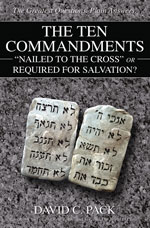Some conclude that these verses state that it does not make a difference to God which days we keep. They take these verses out of context and apply their own meaning. In order to grasp the true intent, we must read starting where the context of the subject begins—not just these two verses. Verses 1-4 identify the subject in context as vegetarianism—not which days should be kept.
Notice: “One man esteems one day above another: another esteems every day alike. Let every man be fully persuaded in his own mind. He that regards the day, regards it unto the Lord; and he that regards not the day, to the Lord he does not regard it. He that eats, eats to the Lord, for he gives God thanks; and he that eats not, to the Lord he eats not, and gives God thanks” (Rom. 14:5-6).
Does Paul state here that Jesus, by His death, did away with the very days He kept during His whole life? No! Does he say, “God esteems one day above another” and “God esteems every day alike?” Again, no! The verse says, “One man esteems one day above another.” This is telling us that it was what men were teaching, not what God says.
Christ is not going to judge us by what any man believes. He will judge us by His Word, the Bible. “…the word that I have spoken, the same shall judge him in the last day” (John 12:48).
Notice that the saints at Rome were forbidden to judge one another: “Who are you that judges another man’s servant? To his own master he stands or falls. Yes, he shall be helped up: for God is able to make him stand” (Rom. 14:4).
Paul is not condemning a particular period of time, but he is warning the saints not to judge one another and cause strife for having differing opinions about things. Those in Rome were weak in the faith. They had not yet matured spiritually. Paul says, “For I long to see you, that I may impart unto you some spiritual gift, to the end that you may be established” (Rom. 1:11).
This in no way is giving a license to believe whatever you want. God commands, “…and lean not unto your own understanding” (Prov. 3:5). Until you know what God says in His word, how are you going to be fully assured in your own mind? Paul stated, “the holy scriptures…are able to make you wise unto salvation” (II Tim. 3:15).
Paul is writing to both Jewish and Gentile converts at Rome. He advised them to accept those who were weak in the faith (Rom. 14:1), and to not dispute with them over insignificant matters, nor sit in judgment of them. Some of these newly converted Gentiles, being weak in the faith, were vegetarians and refused to eat meats.
The reason they did not eat meat is explained in I Corinthians 8. Most meat available for purchase at the market had been previously offered to idols at pagan temples. Therefore, some, with conscience of the idol, ate it “as a thing offered unto an idol; and their conscience being weak is defiled. But meat commends us not to God: for neither, if we eat, are we the better; neither, if we eat not, are we the worse” (vs. 7-8). Some of the converts at Rome, who had given up idolatry, were Gentiles. Still being superstitious, they thought the idol was something real.
What were these days Paul was referring to? Why did Paul break into this thought—about eating meat—and mention “days?” The answer is found in the Moffatt translation: “Then again, this man rates one day above another, while that man rates all days alike. Well, everyone must be convinced in his own mind; the man who values a particular day does so to the Lord. The eater eats to the Lord, since he thanks God for his food; the non-eater abstains to the Lord, and he too thanks God” (Rom. 14:5-6).
Notice! Not only were there weak converts who avoided eating meat offered to idols, but there were others who customarily abstained from particular foods. They semi-fasted on certain particular days. Still others refused to practice a semi-fast or abstain from foods, but regarded every day in the same way!
A number of Jews of that time would often hold a semi-fast twice in the week (Luke 18:12). Some would also fast during the fifth and seventh months (Zech. 7:4-7). They were divided as to exactly when to fast. The Gentile converts were also divided as to what days to abstain from certain foods. Because of the differing backgrounds of these people, they could not agree on which days to do this. There were divisions in the congregation. Jesus taught us that fasting is something that is done without making it obvious to others (Matt. 6:16). It is a personal matter, between an individual and God.
The subject of this question surrounded the matter of abstinence on particular days—upon which days many voluntarily abstained from certain foods. It did not involve whether or not to keep pagan holidays or God’s Holy Days.


















